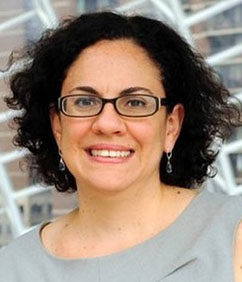Lourdes Rosado ’95 describes inequalities facing Latinx people in annual Latinx in the Law Lecture
The 2020 US census found that Latinx people make up 18.9 percent of the US population—the second largest racial or ethnic group in the US. Yet fewer than two percent of elected officials and fewer than six percent of lawyers are Latinx, said Lourdes Rosado ’95, president and general counsel of LatinoJustice PRLDEF, as she delivered the Latinx in the Law Lecture on November 15. This inadequate representation creates less positive economic and educational outcomes for the Latinx community, as people in power fail to address or understand the needs of a community which has suffered from centuries of discrimination, Lourdes said.
Presented by NYU Law’s Latinx Rights Scholarship Program, the annual Latinx in the Law Lecture honors an advocate, lawyer, policymaker, or organizer who has worked directly on issues affecting the Latinx community. After a clerkship with Judge John Padova of the US District Court for the Eastern District of Pennsylvania, Rosado became a litigator at Philadelphia’s Juvenile Rights Center, where she eventually became associate director. In 2016 she was named chief of the Civil Rights Bureau in the New York State Office of the Attorney General, and in 2019 she became the inaugural program director for the New York Civil Liberties Union. She joined LatinoJustice PRLDEF, a national civil rights litigation and advocacy organization focused on addressing discrimination, as president and general counsel in September 2021.
In her remarks, Rosado noted that a defining moment in her legal education was taking the Juvenile Defender Clinic, which inspired her to continue to work with children in the welfare and justice systems after graduation. While leading the civil rights bureau, she added, she drew on her NYU Law roots: Rosado and then-colleague Anjana Samat ’01 invited Robert A. Kindler Professor of Law Adam Cox to speak with their staff about immigration law in relation to sweeping anti-immigration policies instituted by the Trump administration.
“The only way you can address this space of inequity is to be keenly aware of it,” Rosado said, “and provide the resources and thoughtfulness that’s needed.”
Selected Remarks by Lourdes Rosado
“We specifically are very concerned about youth in this country who do not speak English as their first language and therefore are considered English learners. We know that English learners are a large and growing share of the US population, and then almost 80 percent of them are Latinx. And this creates challenges for our community, because even though we’re at these high numbers and even though there are greater legal protections and funding than was available, let’s say, 50 years ago, school districts are still not meeting the challenge of educating these students, and their success is really crucial to the advancement of the community.”
“Another key area is voting. As many of you know, we’ve seen what I call a tsunami of voter suppression laws around the country in the last several years. And certainly these laws are specifically targeted at silencing the voices of Black and brown voters.…The very fact that people in power and privilege are going through all this effort and spending all of this money to restrict voting power just shows that they recognize the power....That’s why they’re going through these extraordinary efforts to suppress it.”
Posted December 9, 2022.


